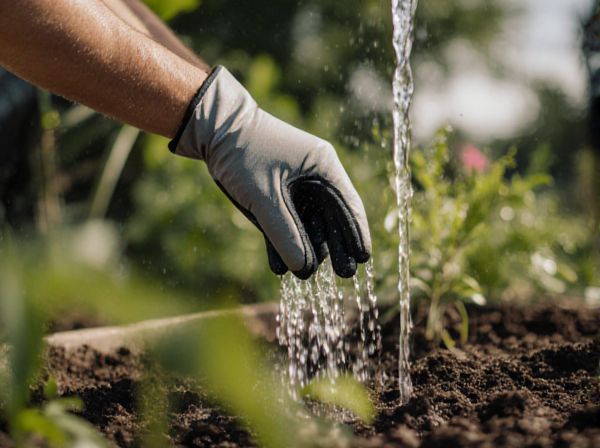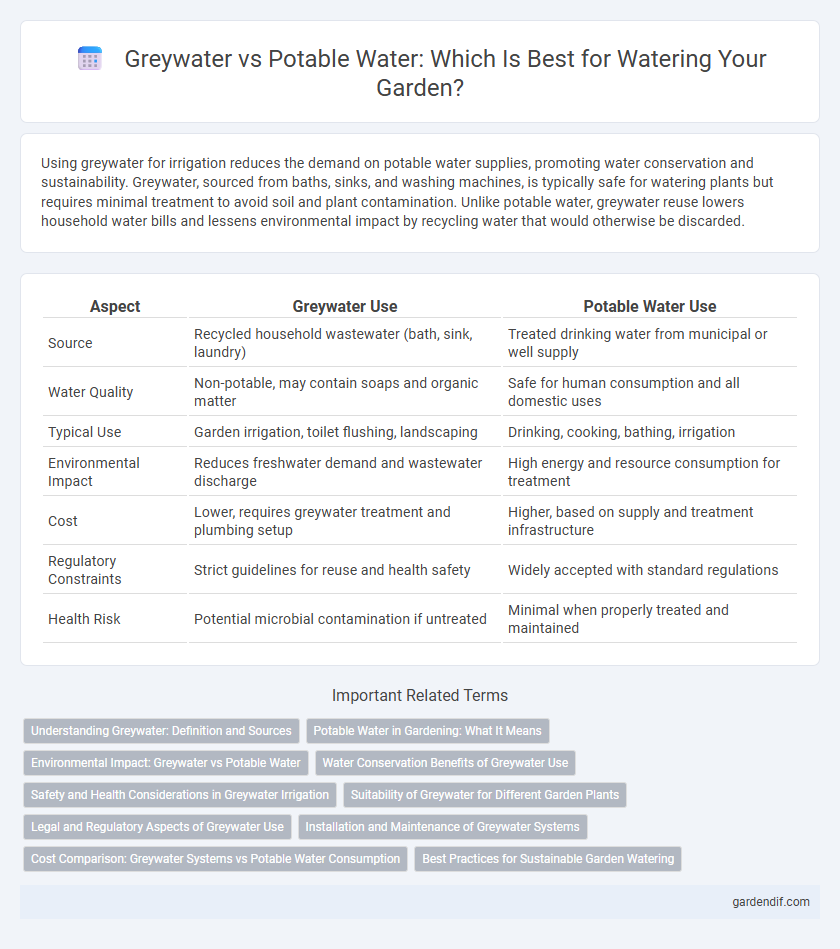
Greywater use vs potable water use Illustration
Using greywater for irrigation reduces the demand on potable water supplies, promoting water conservation and sustainability. Greywater, sourced from baths, sinks, and washing machines, is typically safe for watering plants but requires minimal treatment to avoid soil and plant contamination. Unlike potable water, greywater reuse lowers household water bills and lessens environmental impact by recycling water that would otherwise be discarded.
Table of Comparison
| Aspect | Greywater Use | Potable Water Use |
|---|---|---|
| Source | Recycled household wastewater (bath, sink, laundry) | Treated drinking water from municipal or well supply |
| Water Quality | Non-potable, may contain soaps and organic matter | Safe for human consumption and all domestic uses |
| Typical Use | Garden irrigation, toilet flushing, landscaping | Drinking, cooking, bathing, irrigation |
| Environmental Impact | Reduces freshwater demand and wastewater discharge | High energy and resource consumption for treatment |
| Cost | Lower, requires greywater treatment and plumbing setup | Higher, based on supply and treatment infrastructure |
| Regulatory Constraints | Strict guidelines for reuse and health safety | Widely accepted with standard regulations |
| Health Risk | Potential microbial contamination if untreated | Minimal when properly treated and maintained |
Understanding Greywater: Definition and Sources
Greywater refers to gently used water from sinks, showers, and washing machines, excluding sewage or toilet discharge, making it a sustainable alternative for irrigation and flushing toilets. Utilizing greywater reduces reliance on potable water sources, conserving treated drinking water and decreasing overall water demand. Understanding the sources and safe management of greywater is essential for optimizing its use in residential and commercial landscaping.
Potable Water in Gardening: What It Means
Potable water in gardening refers to water that meets health and safety standards for human consumption, making it safe for watering edible plants and sensitive landscapes. Using potable water ensures contaminants and pathogens are minimized, reducing health risks associated with gardening activities. While greywater reuse helps conserve potable water, relying on potable water remains essential for maintaining plant health and consumer safety in food production.
Environmental Impact: Greywater vs Potable Water
Greywater reuse significantly reduces potable water consumption, decreasing the environmental footprint of household water use by lowering demand on freshwater resources and reducing sewage discharge. Using greywater for irrigation or non-potable applications conserves energy by minimizing the need for water treatment and distribution, resulting in lower greenhouse gas emissions. Compared to potable water, greywater recycling promotes sustainable water management by enhancing water efficiency and supporting ecosystem health.
Water Conservation Benefits of Greywater Use
Greywater use significantly reduces potable water consumption by recycling wastewater from showers, sinks, and laundry for irrigation and toilet flushing, leading to water savings of up to 50%. This practice decreases the demand on municipal water supplies and mitigates the strain on sewage treatment systems. Implementing greywater systems supports sustainable water management and helps conserve valuable freshwater resources in residential and commercial settings.
Safety and Health Considerations in Greywater Irrigation
Greywater irrigation reduces potable water demand but requires careful management to prevent health risks associated with pathogens and chemical contaminants. Proper treatment and filtration systems are essential to minimize exposure to harmful bacteria, viruses, and residual soaps or detergents. Ensuring greywater use complies with local health regulations and employs safe irrigation techniques, such as subsurface application, protects human health and prevents environmental contamination.
Suitability of Greywater for Different Garden Plants
Greywater, containing minimal contaminants, is suitable for irrigating non-edible plants such as ornamental shrubs, trees, and turf, reducing reliance on potable water. Sensitive edible plants like leafy greens and root vegetables require potable water to avoid potential health risks from contaminants in greywater. Understanding plant tolerance and proper greywater treatment can optimize water efficiency while safeguarding garden health.
Legal and Regulatory Aspects of Greywater Use
Legal and regulatory aspects of greywater use vary significantly across regions, with many jurisdictions imposing strict guidelines to ensure public health and environmental safety. Regulations often mandate treatment standards, permissible uses, and system approval processes to differentiate greywater from potable water, preventing cross-contamination risks. Compliance with local codes, such as the Uniform Plumbing Code or state-specific greywater regulations, is essential for lawful greywater irrigation and reuse practices.
Installation and Maintenance of Greywater Systems
Greywater systems require professional installation to ensure proper filtration, piping, and compliance with local plumbing codes, minimizing risks of contamination and system failure. Maintenance involves regular inspection of filters, pumps, and tanks to prevent clogs and bacterial growth, extending system lifespan and efficiency. Properly maintained greywater setups can significantly reduce potable water consumption for irrigation, promoting sustainable water management practices.
Cost Comparison: Greywater Systems vs Potable Water Consumption
Greywater systems typically reduce water bills by recycling household wastewater for irrigation, lowering potable water consumption costs significantly. Initial installation costs for greywater systems range from $500 to $3,000, but long-term savings on municipal water rates often offset these expenses within a few years. In contrast, relying solely on potable water for watering plants can result in higher ongoing costs due to increasing water rates and stricter usage regulations.
Best Practices for Sustainable Garden Watering
Utilizing greywater for garden watering reduces potable water consumption by diverting treated household wastewater from baths, sinks, and laundry to irrigation systems, improving sustainability. Best practices include filtering greywater to remove contaminants, avoiding use on edible plants, and employing drip irrigation to optimize water delivery and minimize waste. Regular system maintenance and local regulation compliance ensure safe, efficient reuse of greywater in sustainable garden watering.
Greywater use vs potable water use Infographic

 gardendif.com
gardendif.com